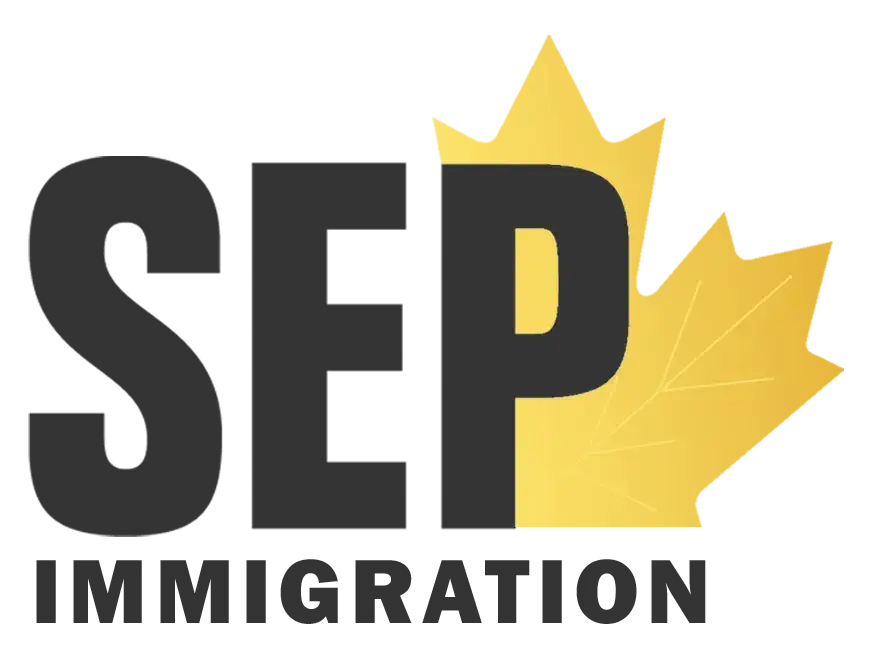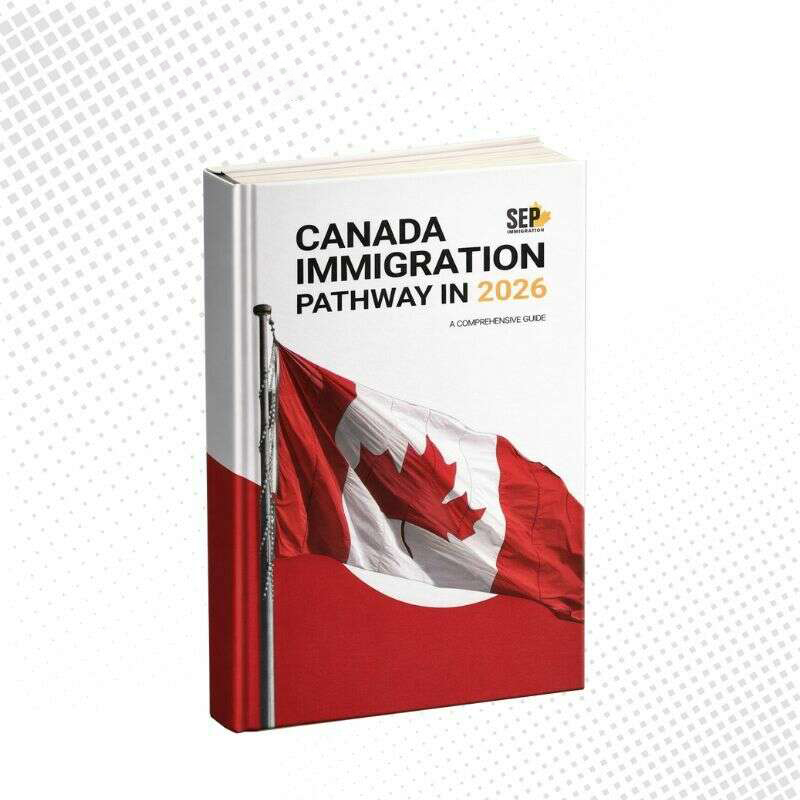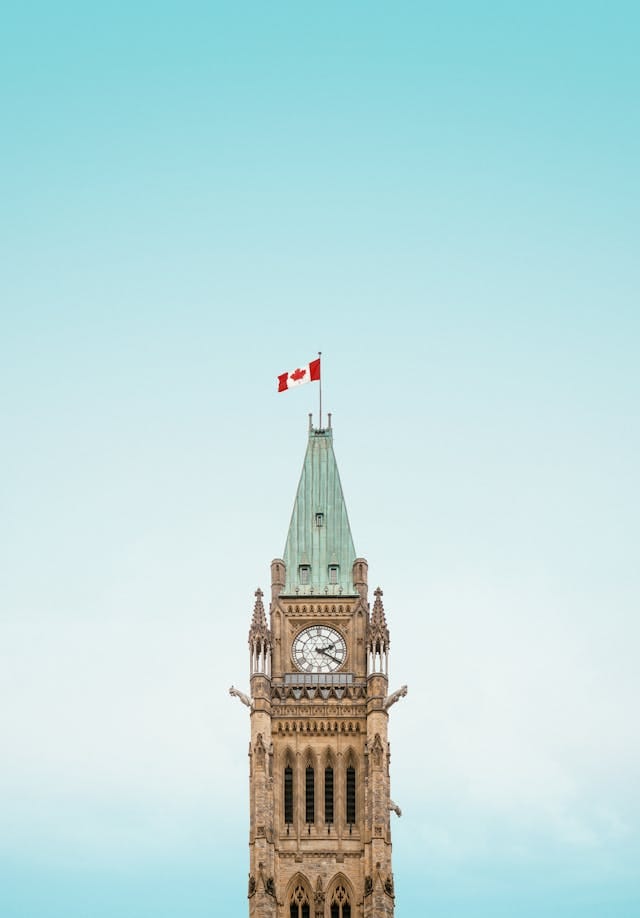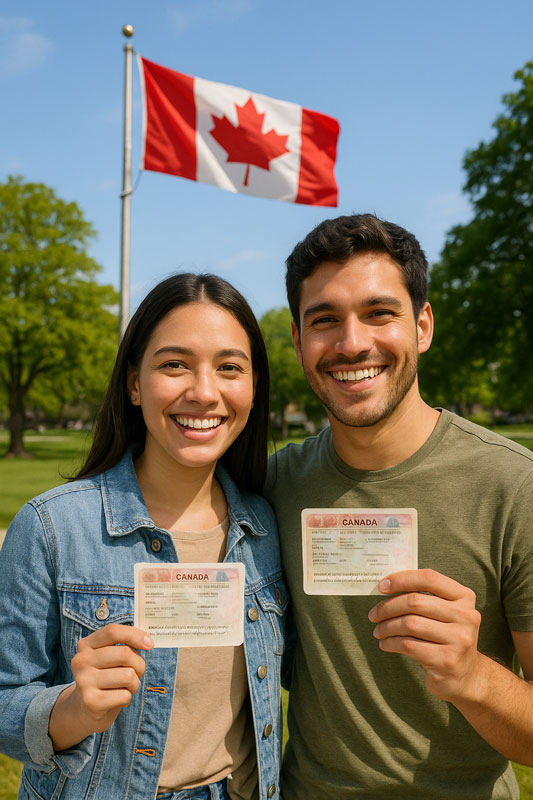Table of Contents
ToggleWhat Is Canada’s Spousal Sponsorship Program?
Canada’s Spousal Sponsorship Program allows Canadian citizens and permanent residents to bring their spouse or common-law partner to Canada as a permanent resident. The aim of this program is to keep families together by allowing the sponsored person to live, work, and study in Canada.
There are two main pathways: Inland sponsorship, for those already in Canada, and Outland sponsorship, for those living outside the country. To qualify, the sponsor must meet certain financial criteria and agree to support their partner for three years. The process involves submitting an application with proof of the relationship and other required documents.
Once approved, the sponsored spouse receives permanent residency, giving them the same rights as any other permanent resident in Canada. This program helps families build a life together in Canada.
Canada’s Spousal Visa Eligibility Requirements
Sponsor Requirements :
- Must be a Canadian citizen or permanent resident.
- Must be at least 18 years old.
- Cannot be receiving social assistance, except for disability reasons.
- Must prove the ability to financially support the spouse for three years.
Sponsored Person Requirements :
- Must be legally married to the sponsor or in a common-law relationship for at least 12 months.
- Needs to provide proof of a genuine relationship, such as photos, joint financial documents, and communication history.
- Must undergo medical, criminal, and background checks.
General Eligibility :
Both the sponsor and the sponsored person should not have any inadmissibility issues, such as serious criminal records. Meeting these requirements is crucial for a successful application, allowing the sponsored person to live permanently in Canada.
Confirm Eligibility
Gather Documents
Submit Application
Pay Fees
Undergo Checks
Wait for Processing
Your Obligations as a Sponsor
Financial Support Commitment :
As a sponsor, you must provide financial support for your spouse for at least three years from the date they become a permanent resident. This support covers basic needs like food, shelter, and healthcare not provided by public services.
Responsibility Regardless of Relationship Status :
Even if your relationship with your spouse ends during this period, your financial responsibility remains. You are obligated to continue supporting them for the full three years.
Avoiding Social Assistance
You must ensure your spouse does not rely on social assistance during the sponsorship period. If they do, you may be required to repay any social assistance benefits they receive.
Note: Fulfilling these obligations is crucial for maintaining your status as a sponsor and ensuring your spouse’s well-being in Canada. Failure to meet these responsibilities could have legal and financial consequences.

The Process of Spousal Sponsorship in Canada
- Check Eligibility
Ensure both you and your spouse meet the eligibility criteria, including age, relationship status, and financial requirements. It’s crucial to verify these details before beginning the process. - Gather Required Documents
Collect all necessary documents, such as proof of relationship, identification, financial statements, and other evidence. Proper documentation is essential to avoid delays in processing. - Complete Application Forms
Fill out the required application forms for both the sponsor and the sponsored person, which are available on the IRCC (Immigration, Refugees, and Citizenship Canada) website. - Submit the Application
Submit the complete application package, including all forms, documents, and the processing fee, to IRCC. Double-check everything to ensure nothing is missing. - Wait for Processing
After submission, IRCC will review your application. Processing times can vary widely, so be prepared for a waiting period that could extend several months. - Medical and Background Checks
The sponsored spouse must undergo medical, criminal, and background checks as part of the assessment process. These checks are mandatory and can influence the application outcome. - Receive Decision
If approved, your spouse will receive confirmation of permanent residence, allowing them to move to Canada. If further information is needed, IRCC will reach out to you for clarification. - Fulfill Sponsorship Obligations
Once your spouse arrives in Canada, you must begin fulfilling your financial support obligations, which last for three years. This commitment is legally binding, regardless of any changes in your relationship status.
Canada’s Spousal Sponsorship Processing Time
The processing time for Canada’s Spousal Sponsorship can vary depending on several factors, including whether the application is Inland or Outland.Generally, Inland applications, where the spouse is already in Canada, take about 12 months to process.
Outland applications, where the spouse is outside Canada, also typically take around 12 months, but times can vary based on the country of residence and additional factors like the completeness of the application.
During the processing period, IRCC may request additional information or documentation, which can extend the timeline. It’s important to regularly check the status of your application online and respond promptly to any requests from IRCC to avoid delays.
While the typical timeframe is 12 months, processing times can fluctuate, so it’s advisable to be prepared for potential variations.
Note: Processing times in Quebec can take longer, up to 24 months, because Quebec has its own immigration system. After federal approval, applicants must obtain a Quebec Selection Certificate (CSQ), which involves additional documentation and meeting provincial requirements. This extra step adds time to the overall process, making it longer than in other provinces.
Canada’s Spousal Visa Fees
When applying for a Canada Spouse Visa, it’s essential to understand the fees involved to ensure you are well-prepared.
Primary Fees
- Sponsorship Fee: 75 Canadian dollars.
- Principal Applicant Processing Fee: 570 Canadian dollars.
- Right of Permanent Residence Fee: 515 Canadian dollars.
The total for these fees is 1,160 Canadian dollars, covering the core components of your application.
Additional Fees
If you include dependent children in your application, there is an additional fee of 150 Canadian dollars per child. Most applicants will also need to complete biometrics, which involves submitting fingerprints and a photograph:
- Biometrics Fee: 85 Canadian dollars per person or 170 Canadian dollars for a family.
Payment and Refunds
All fees must be paid in full before submitting your application. It is important to retain your payment receipts, as these may be required during the processing of your application.
Please note that these fees are non-refundable, meaning that if your application is not approved, you will not receive a refund.
To minimize the risk of any issues, it is crucial to ensure your application is complete and includes all necessary documents. This careful preparation can help facilitate a smoother application process and improve your chances of success.

5 Common Reasons for Your Application’s Rejection
Spousal sponsorship applications can be rejected for several reasons, often due to oversights or misunderstandings. Being aware of these common pitfalls can help applicants avoid costly delays:
- Insufficient Proof of a Genuine Relationship: The application must demonstrate that the relationship is authentic and not solely for immigration purposes. Failure to provide compelling evidence, such as shared financial responsibilities, photographs, communication history, or testimonies, can lead to rejection.
- Incomplete or Incorrect Application Forms: Missing fields, incorrect information, or unsigned forms are frequent reasons for applications being returned or denied.
- Missing Supporting Documents: A lack of required documents, such as marriage certificates, proof of cohabitation, or identification papers, can result in application denial.
- Financial Ineligibility of the Sponsor: Sponsors must meet financial requirements to prove they can support their spouse. Sponsors who fail to demonstrate adequate financial stability or who are in default on previous sponsorships may face rejection.
- Inadmissibility Issues: Criminal records, medical issues, or misrepresentation in previous applications can make the sponsored spouse inadmissible to Canada.
ensure your application is complete and accurate
6 Tips for Strengthening Your Application
A well-prepared application will greatly increase the chances of approval. Here are key tips to strengthen your spousal sponsorship application:
- Provide Comprehensive Relationship Evidence: Include a variety of evidence showing the history and authenticity of your relationship. Examples include joint leases, photos from various stages of the relationship, messages, emails, and proof of travel together.
- Demonstrate Financial Readiness: Submit bank statements, employment letters, and tax returns to show the sponsor’s ability to meet financial obligations.
- Be Honest and Transparent: Misrepresentation or withholding of certain information will lead to denial and even a ban from future applications.
- Organize Your Application: Use a clear and logical structure for your documents, with labeled sections. This will make it easier for immigration officers to review your application.
- Consult a Professional: If your case is complex, consider hiring an immigration lawyer to help you through the process of spousal sponsorship.
- Double-Check Before Submission: Please make sure that all your forms are completed and signed and that the application package includes all required documents and fees.
Post-Arrival Integration Support
Once the sponsored spouse arrives in Canada, integrating into a new environment can be exciting and challenging. Here are resources and strategies to ease the transition:
- Settlement Services: Many local organizations offer free settlement services, including language classes, employment support, and cultural orientation sessions.
- Healthcare Enrollment: Sponsored spouses should register for provincial or territorial health insurance to access medical services.Community Networks: Joining local community groups, especially those catering to newcomers, can help build social connections and provide valuable advice.
- Employment Assistance: Employment centers can assist with resume writing, job searches, and interview preparation to help the spouse enter the Canadian workforce.Understanding Rights and Responsibilities: Spouses must learn about their rights and obligations as permanent residents, including residency requirements to maintain their status.
- Mental Health Resources: Adjusting to life in a new country can be stressful. If needed, newcomers should seek support from mental health services.
Spousal Sponsorship for LGBTQ+ Couples
Canada is well-known for its progressive stance on LGBTQ+ rights, including equal treatment in spousal sponsorship. However, LGBTQ+ couples may face unique challenges:
- Proving the Relationship: In countries where same-sex relationships are not legally recognized or socially accepted, gathering evidence of the relationship can be difficult. Providing affidavits from friends and family, photographs, and communication records can help substantiate the relationship.
- Cultural and Legal Barriers: LGBTQ+ couples may face discrimination or difficulty obtaining documents such as marriage certificates in their home country. Canada accepts alternative proofs in such cases, such as evidence of common-law partnership.
- Support Networks: LGBTQ+ newcomers can benefit from organizations like Rainbow Refugee and other groups dedicated to supporting LGBTQ+ immigrants.
- Challenges with Disclosure: Some applicants may fear disclosing their sexual orientation in the application due to stigma. Working with a trusted advisor is important to ensure the application process is safe and thorough.
What Happens If the Sponsor Cannot Fulfill Their Obligations?
Sponsors have a legal responsibility to financially support their spouses for three years after they become permanent residents. Failing to meet these obligations can lead to serious consequences:
- Repayment of Social Assistance: The sponsor must repay the amount received if the sponsored spouse relies on social assistance during the sponsorship period.
- Impact on Future Sponsorships: A sponsor who fails to meet their obligations may be barred from sponsoring anyone else in the future.
- Legal Consequences: In extreme cases, sponsors may face lawsuits or wage garnishment to recover social assistance costs.
- Strategies for Sponsors in Difficulty: If a sponsor is struggling financially, they should seek help from community organizations or legal advisors to explore options and avoid breaching their agreement.
Maintaining Status During Inland Sponsorship
For spouses already in Canada on a temporary status, it is crucial to maintain their legal status throughout the inland sponsorship process. Losing status can complicate or delay the application.
Applicants can apply for a visitor record, work permit, or study permit extension to remain in Canada legally while their sponsorship application is being processed.
A key benefit of the inland sponsorship route is the ability to apply for an Open Work Permit alongside the sponsorship application. This allows the sponsored spouse to work while waiting for permanent residency, helping them contribute financially and gain Canadian work experience.
Maintaining communication with Immigration, Refugees, and Citizenship Canada (IRCC) and staying informed about application updates ensures a smooth process.

Spousal Sponsorship in Quebec
Quebec has its own immigration system, adding unique steps to the spousal sponsorship process. After receiving federal approval, applicants must obtain a Quebec Selection Certificate (CSQ) from the provincial government. This involves submitting additional documents, such as proof of financial stability and declarations of intent to settle in Quebec.
Quebec’s sponsorship requirements include a commitment to financially support the sponsored spouse for three years, as in the federal process. However, sponsors may need to meet additional criteria specific to the province. Due to these extra requirements, processing times in Quebec are generally longer, often extending up to 24 months.
Sponsors and applicants must familiarize themselves with both federal and provincial processes to ensure their applications meet all guidelines. Seeking guidance from immigration consultants familiar with Quebec’s system can also be beneficial.
7 Common Reasons for Quebec’s Spousal Sponsorship Rejections
Understanding common reasons for refusals can help you avoid them. Here’s what you need to watch out for:
1. The Sponsor Doesn’t Meet the Eligibility Requirements
Not everyone qualifies to sponsor their spouse. You must be at least 18, a Canadian citizen, and not receiving social assistance (except for disabilities). You also can’t sponsor if you default on child support, immigration loans, or past sponsorship agreements. Before applying, make sure you meet all the criteria.
2. The Sponsored Partner Is Ineligible
Your spouse or partner must also meet certain requirements. They need to be legally married to you, in a common-law relationship or have lived with you for at least a year in a conjugal partnership. Past criminal convictions, medical issues, or misrepresentation on a previous visa can also make them inadmissible. Check these factors early to avoid complications.
3. Weak Proof of a Genuine Relationship
Immigration officers look for red flags that indicate a marriage of convenience. If your application lacks proof of a real relationship, it may be denied. You need to show a strong paper trail—wedding photos, joint bank accounts, text messages, travel history, and letters from family and friends can all help. The more evidence, the better.
4. Incomplete or Incorrect Applications
One of the most common reasons for refusal is missing information or errors in the forms. A single forgotten signature or an unanswered question can result in rejection. Double-check every document before submission. If needed, consider getting help from an immigration consultant or lawyer.
5. Financial Issues
Unlike some other sponsorship categories, spousal sponsorship doesn’t have a strict income requirement. However, you must show that you can financially support your spouse. If you’ve declared bankruptcy or are in significant debt, immigration officials may question your ability to provide for your partner. Be prepared to submit bank statements, pay stubs, or tax returns as proof.
6. Not Declaring Family Members
If your spouse has dependent children, they must be listed in the application—even if they’re not immigrating with them. Failure to declare all family members could cause serious problems in the future, including being barred from sponsoring them later.
7. Residency Issues
If you’re a permanent resident, you must be living in Canada when applying. If you’re a Canadian citizen, you can apply from abroad, but you need to prove you’ll move back to Canada once your spouse is approved. Failing to meet these residency rules could lead to a rejection.
You may sponsor your spouse, common-law partner, or conjugal partner to come to Canada as a permanent resident.
- Sponsor must be 18 or older
- Must be legally married or in a common-law relationship
- The relationship must be genuine and supported by documents
- Both the sponsor and the applicant must meet IRCC eligibility rules
(If Applicable)
A partner’s dependent children can be included in the same application.
- The child must be under 22
- Must be unmarried
- Biological or adopted children are eligible
- Birth certificates and identity documents are required
Sponsor your parents or grandparents through PGP program
- Meet income threshold for 3 years
- Sign sponsorship agreement
- Submit interest to sponsor form
- Selected through lottery system
Impact of Criminal Record on Spousal Sponsorship Applications
A criminal record can complicate the spousal sponsorship process in Canada. Both the sponsor and the spouse being sponsored need to meet eligibility criteria, and past convictions can be a major obstacle. However, there are ways to address this issue. Here’s what you need to know.
How a Sponsor’s Criminal Record Can Affect Sponsorship
If you’re sponsoring your spouse and have a criminal record, your application may be rejected depending on the type of offense.
Convictions related to violent crimes, sexual offenses, child abuse, or domestic violence are taken seriously by Immigration, Refugees and Citizenship Canada (IRCC). You might not be allowed to sponsor your partner if you’ve been convicted of such offenses.
That said, immigration officers will look at the details of your case, including how much time has passed since your conviction and whether you’ve demonstrated rehabilitation. If you’ve completed your sentence long ago and have stayed out of trouble, your chances of approval may be better.
What Happens If the Sponsored Spouse Has a Criminal Record?
If your spouse has a criminal record, they might be considered inadmissible to Canada. This can happen even if the conviction was outside Canada. Common offenses that can lead to a refusal include:
- Assault
- Theft
- Drug-related crimes
- DUI (Driving Under the Influence)
Being deemed inadmissible doesn’t mean your spouse has no options. Depending on the severity of the offense and how much time has passed since the sentence was completed, they might be able to apply for a Criminal Rehabilitation or a Temporary Resident Permit (TRP) to overcome the issue.
How to Overcome Criminal Inadmissibility
There are two main ways your spouse can address a past conviction:
Criminal Rehabilitation – If at least five years have passed since your spouse completed their sentence, they can apply for Criminal Rehabilitation. This is a one-time process that permanently clears their inadmissibility, allowing them to immigrate without issues.
Temporary Resident Permit (TRP) – If not enough time has passed to qualify for Criminal Rehabilitation, your spouse may be able to apply for a TRP. This permit grants temporary entry into Canada and is issued at the discretion of immigration officials. TRPs are typically granted if there is a valid reason for the person to be in Canada, such as family reunification.
Be Honest About Criminal History
One of the biggest mistakes applicants make is hiding a criminal record. Immigration authorities run background checks, so any undisclosed information can lead to misrepresentation, which can get the application rejected or even result in a ban from entering Canada. It’s always best to be upfront about any past convictions and explore available solutions.

How Life Changes (Divorce, Death, or Financial Hardship) Affect Sponsorship Commitments
Sponsoring a spouse for Canadian permanent residency is a long-term commitment; life can sometimes take unexpected turns. Divorce, the death of a spouse, or financial struggles can raise questions about your sponsorship responsibilities. Here’s what you need to know about how these situations impact your obligations.
What Happens If You Divorce?
Even if your marriage ends, your sponsorship responsibilities don’t disappear. When you sign the sponsorship agreement, you commit to financially supporting your spouse for three years from the date they receive permanent residency. This commitment remains in place even if you and your spouse separate or divorce.
If your ex-spouse applies for government assistance during this period, you will be required to repay any funds they receive. The government holds sponsors accountable for their commitments, and there’s no way to withdraw your sponsorship due to a breakup. Planning ahead and understanding this responsibility before applying is essential.
A sponsorship application allows Canadian citizens and permanent residents to help close family members become permanent residents of Canada. The process involves confirming eligibility, gathering official forms along with supporting records, paying government fees, and submitting everything to the IRCC. Timelines differ based on the type of relationship and where the applicant currently lives. Missing documents or incomplete information often lead to delays, so careful preparation makes a real difference in how smoothly the application moves forward.
 SEP IMMIGRATION
SEP IMMIGRATIONWhat If Your Sponsored Spouse Passes Away?
Losing a spouse is devastating, and while sponsorship commitments usually end in the event of their death, there are exceptions. If you also sponsor their dependent children, your financial responsibility for them continues. It’s important to notify Immigration, Refugees, and Citizenship Canada (IRCC) as soon as possible so they can update their records.
Dealing with Financial Struggles During Sponsorship
Life circumstances change, and financial difficulties can happen to anyone. However, experiencing financial hardship—whether due to job loss, illness, or other challenges—doesn’t automatically relieve you of your sponsorship obligations. If your spouse needs government assistance while still under your sponsorship, you will be expected to repay those costs.
If you anticipate challenges, consider saving a financial cushion to ensure you can support them even in difficult times.

7 Interview Tips for Spousal Sponsorship Applicants
A spousal sponsorship interview is a critical step in the immigration process. Immigration officers use it to assess whether your relationship is real or if it’s just for immigration purposes. Being prepared can make a big difference in how smoothly things go.
Know What to Expect
The main goal of the interview is to confirm that your relationship is genuine. Officers will ask about how you met, your life as a couple, and your plans. They’re looking for consistency between what you say in the interview and what’s in your application. Any contradictions could raise doubts and potentially lead to a refusal.
Review Your Application
Before the interview, go through everything you submitted in your application. Refresh your memory on dates, places, and key events in your relationship. If you and your partner give conflicting answers, it could cause problems. You don’t need to memorize every detail, but you should be familiar enough to answer confidently.
Bring the Right Documents
Having strong evidence to back up your relationship helps strengthen your case. Bring original documents and copies, including:
- Marriage certificate – Proof that you’re legally married.
- Communication records – Text messages, emails, or call logs that show regular contact.
- Financial documents – Joint bank account statements, shared leases, or bills in both names.
- Photos together – A variety of pictures from different times, including with family and friends.
- Proof of living together – Rental agreements, utility bills, or anything showing you share a home.
Organizing these documents in order of events can help present a clear story of your relationship.
Prepare for Common Questions
Officers ask questions to verify details and ensure both of you provide similar answers. Some common topics include:
- How and when did you meet?
- The timeline of your relationship, including major events like engagements or trips together.
- Daily routines and how you share responsibilities.
- Information about each other’s families and close friends.
- Future plans, including living arrangements and discussions about children.
Going over these topics together beforehand can help you stay consistent. It’s normal to feel nervous, but preparation can help you stay calm and confident.
Be Honest and Stay Consistent
If you don’t remember something, don’t guess. It’s better to admit you’re unsure than to give an answer that contradicts what your partner says or what’s in your application. Immigration officers are trained to notice inconsistencies and even small discrepancies can raise red flags.
Make a Good Impression
Treat this like a formal interview. Dress appropriately and arrive on time. Being polite and composed can help set the right tone. If you’re anxious, take deep breaths and focus on answering honestly rather than trying to sound perfect.
Understand Possible Outcomes
Once the interview is over, you’ll face one of three possible outcomes:
- Approval – If everything checks out, your application moves forward without issues.
- Request for more information – If the officer needs additional proof, they may ask for more documents.
- Refusal – If the officer isn’t convinced the relationship is real, the application could be denied.
The Role of Proof of Relationship in Strengthening Your Application
When applying for spousal sponsorship, proving that your relationship is real is one of the most important parts of the process. Immigration officers need clear evidence that your marriage or partnership is based on a genuine commitment and not just for immigration benefits.
Official Marriage Certificate
Your marriage certificate is the starting point of your evidence. It confirms that your marriage is legally recognized. However, it isn’t enough on its own—immigration officers need more than just a legal document to verify the authenticity of your relationship. If your certificate is in a language other than English or French, make sure to provide a certified translation.
Photos That Show Your Journey Together
A collection of photos can help tell the story of your relationship. The key is to include a mix of pictures that reflect different aspects of your life as a couple. Label each photo with dates, locations, and short descriptions to add context.
- Wedding and Engagement Photos – Formal pictures from your wedding ceremony and any engagement celebrations.
- Casual Everyday Photos – Pictures of you spending time together, whether at home, traveling, or doing daily activities.
- Group Photos with Family and Friends – These help establish that your relationship is well-known and accepted by those close to you.
- Celebrations and Holidays – Photos from birthdays, holidays, and special occasions showing that you share important moments.
Communication Records
If you’ve spent time apart, showing ongoing communication is essential. The more varied and continuous your contact has been, the better. Select meaningful exchanges rather than just generic greetings.
- Text messages and chats – Screenshots or transcripts of conversations over time. Avoid excessive redactions.
- Emails and letters – Particularly useful if you have exchanged long-distance messages.
- Call logs and video chat history – Proof that you stay connected through phone or video calls, especially if you’ve lived in different countries.
- Social media interactions – Comments, tags, and posts can demonstrate the nature of your relationship over time.
Financial and Legal Ties
Having financial or legal commitments together shows that your relationship goes beyond words. These documents can help establish that you are in a shared life partnership.
- Joint bank accounts – Statements showing transactions from both partners.
- Shared bills and utilities – Electricity, internet, or phone bills with both names.
- Insurance policies – Health, life, or car insurance listing each other as beneficiaries or dependents.
- Lease agreements or mortgage documents – Proof that you live together or have co-owned property.
Travel Records and Visits
If you and your spouse have traveled together or visited each other while living apart, documentation of these trips can strengthen your case.
- Flight itineraries and boarding passes – Travel history showing shared trips.
- Hotel reservations – Confirmations that show you stayed together.
- Passport stamps and visas – Entries and exits from different countries corresponding with your travel history.
- Photos from trips – Candid shots from vacations, family visits, or special occasions.
Letters of Support from Friends and Family
Third-party accounts from people who know you both well can provide valuable support for your application. Ask close friends or family members to write letters that describe your relationship from their perspective.
- How they know you – Their relationship with you and how long they’ve known you.
- Observations of your relationship – Specific examples of time spent together and how they perceive your bond.
- Their contact details – Full name, address, and phone number in case immigration officials need to verify the letter.
These letters should be personal, honest, and notarized, if possible, to add credibility.
Proof of Living Together
Living together is a strong indicator of a committed relationship. If you and your spouse have shared a home, include documents that verify this arrangement.
- Rental agreements or mortgage papers – Both names are listed as tenants or owners.
- Shared utility bills – Electricity, water, or internet accounts with both names.
- Mail addressed to both partners – Government documents or bank statements sent to the same address.
- Photos of your home together – Everyday images showing you both living in the same space.
Personal Statements
Both you and your spouse should write personal statements explaining your relationship in your own words. These should be detailed and sincere, giving immigration officers a sense of your story.
- How you met – Describe where and how your relationship started.
- How your relationship developed – Key milestones, such as meeting family members, moving in together, or getting engaged.
- Challenges and how you overcame them – If you’ve faced long-distance periods or cultural differences, explain how you handled them.
- Future plans – Where you plan to live, what your career goals are, and what your family plans are, if applicable.
How Social Media Activity Can Influence Spousal Sponsorship Approval
Your online presence can impact your spousal sponsorship application more than you might think. Immigration officers sometimes review social media profiles to verify the details in an application. If they find contradictions, it could raise concerns and even lead to a refusal.
Keep Your Information Consistent
Make sure the details you share on social media align with the information in your application. If your profile says you’re single, but your application states you’re married, that inconsistency could cause problems. The same goes for job history, education, or any other personal details—everything should match to avoid unnecessary red flags.
Showing a Real Relationship
You don’t have to flood your social media with posts about your relationship, but having some online presence together can help. Photos, tagged posts, and interactions can support your case. However, if you and your partner prefer to keep things private, you’ll need strong alternative proof, such as photos, communication records, and letters from friends or family confirming your relationship.
Managing Privacy and Content
It’s smart to check your privacy settings. While you want to ensure your online presence supports your application, you should also control who can see your personal information. Review your profiles regularly and update any outdated details that could cause confusion. If something might be misinterpreted, consider adjusting or removing it.
The Risks of Inconsistencies
If immigration officers find false or conflicting information—whether intentional or not—it could lead to serious consequences. A refusal is possible, and in some cases, misrepresentation will result in a five-year ban from entering Canada. It’s always best to be honest and ensure everything you submit aligns with your online presence.
Best Practices
- Check Your Profiles – Make sure your social media details match what you’ve provided in your application.
- Share Wisely – If comfortable, consider posting about your relationship to provide additional credibility.
- Control Privacy – Use privacy settings to limit what others can see, but remember that public content is fair game for review.
- Stay Updated – Regularly review your profiles to ensure they reflect accurate, up-to-date information.
Recent updates to Canada’s Spouse Visa rules, introduced in 2023, aim to improve the application process and ensure that only eligible applicants are approved. Key changes include:
- Stricter Relationship Verification: Since 2023, applicants must provide more substantial evidence of a genuine relationship, such as detailed histories, joint financial accounts, and communication records.
- Commitment to Processing Times: The government is focused on processing most spousal sponsorship applications within 12 months, though times may vary based on the application’s completeness and the applicant’s country of origin.
- Enhanced Medical and Background Checks: New security measures introduced in 2023 require more thorough medical exams and background checks for both the sponsor and the sponsored spouse.
- Clearer Financial Requirements: Sponsors must now demonstrate a stable financial situation, proving they can support their spouse for the required three-year period without relying on social assistance.
These 2023 changes are designed to ensure a more efficient process and to reduce the risk of fraudulent applications.
Yes, there can be an interview for spousal sponsorship in Canada, but it is not always required. Immigration, Refugees, and Citizenship Canada (IRCC) may request an interview if they need further clarification about the relationship between the sponsor and the sponsored spouse.
This interview is usually conducted to assess the genuineness of the relationship and to ensure that the marriage or partnership is not for immigration purposes only.
During the interview, both the sponsor and the sponsored spouse may be asked questions about their relationship, such as how they met, details about their daily life together, and plans for the future.
The interview can take place in Canada or at a Canadian visa office abroad, depending on the situation.
If an interview is required, IRCC will notify you in advance with details on what to expect.
It’s important to be honest and prepared, as the interview can significantly impact the outcome of your application.
Yes, you must provide proof of your relationship with your spouse or partner when applying for spousal sponsorship in Canada. Immigration, Refugees, and Citizenship Canada (IRCC) requires this evidence to confirm that your relationship is genuine and not solely for immigration purposes.
The types of proof you can submit include:
- Marriage Certificate: For married couples, a legal marriage certificate is essential.
- Photos: Include photos of your wedding, vacations, or time spent together to show your relationship history.
- Communication Records: Copies of emails, text messages, or social media interactions that demonstrate ongoing communication.
- Joint Financial Documents: Bank statements, lease agreements, or utility bills that show shared finances or a shared residence.
- Affidavits from Family and Friends: Letters from people who know you as a couple and can attest to the genuineness of your relationship.
You may not be eligible to sponsor a spouse or partner for Canadian immigration if any of the following apply:
- Recent Sponsorship: You are currently sponsoring a spouse or partner but have already signed an undertaking for a previous spouse or partner, and it hasn’t been three years since they became a permanent resident.
- Unpaid Social Assistance: You previously sponsored someone and did not repay any social assistance they received while your undertaking was in place.
- Financial Defaults: You are in default on an immigration loan, a performance bond, or have not paid court-ordered alimony or child support.
- Bankruptcy: You have declared bankruptcy that has not been discharged.
- Criminal Convictions: You were convicted of a sexual offense, a violent crime, an offense against a relative that caused bodily harm, or threatened or attempted to commit any of these offenses. Eligibility depends on the nature of the offense, when it occurred, and whether you received a pardon.
- Previous Sponsorship as a Spouse: You are sponsoring a spouse or partner, but you were previously sponsored as a spouse, common-law, or conjugal partner and became a permanent resident less than five years ago.
- Legal and Penal Restrictions: You are under a removal order, are in a penitentiary, jail, reformatory, or prison, or have already applied to sponsor your current spouse or partner and have not yet received a decision.
These restrictions are in place to ensure that sponsors are capable of meeting their financial and legal responsibilities.
If spousal sponsorship isn’t an option, there are several other ways you can bring your family members to Canada:
Parent and Grandparent Sponsorship
Canadian citizens and permanent residents can sponsor their parents and grandparents to become permanent residents.
This program is often available through a lottery system, and sponsors must meet specific income requirements to ensure they can financially support their parents or grandparents.
Super Visa
If you cannot sponsor your parents or grandparents through the regular sponsorship program, the Super Visa allows them to visit Canada for 5 years at a time with a super visa, with multiple entries over a 10-year period. This visa requires proof of financial support and health insurance.
Dependent Child Sponsorship
You can sponsor your dependent children, including adopted children, to become permanent residents. The child must be under 22 years old, unmarried, and not in a common-law relationship.
Exceptions are made for children over 22 who depend on their parents due to a physical or mental condition.
Family Class Sponsorship
If you don’t have a spouse, common-law partner, or children to sponsor, and no other eligible relatives, you may be able to sponsor one relative of any age or relationship under the Family Class, as long as you meet specific criteria.
Provincial Nominee Program (PNP)
Some provinces have their own immigration programs that allow residents to sponsor family members, even if they do not meet the federal criteria. Each province has its own rules and requirements, so it’s worth exploring the options available in your province.
Humanitarian and Compassionate Grounds
In exceptional cases, you can apply to bring family members to Canada on humanitarian and compassionate grounds. This is usually considered if there are compelling reasons to keep the family together in Canada.
These options provide various pathways for reuniting with your family in Canada, each with its own eligibility requirements and processes. It’s important to explore these options carefully and choose the one that best fits your family’s situation.
If you’re in a relationship with your boyfriend or girlfriend but are not married, you can still potentially sponsor them to come to Canada, but there are specific requirements:
Common-Law Partner
You can sponsor your boyfriend or girlfriend as a common-law partner if you have lived together continuously for at least 12 months in a marriage-like relationship. This means sharing a home and presenting yourselves as a couple.
You will need to provide evidence of cohabitation, such as joint leases, shared bills, or other documentation that shows you have been living together for the required period.
Conjugal Partner
If you haven’t lived together for 12 months due to significant barriers, like immigration restrictions, you may be able to sponsor your partner as a conjugal partner.
However, this category is intended for couples who cannot live together or get married due to reasons beyond their control, such as legal or cultural restrictions.
You must demonstrate that you have a committed relationship of at least 12 months and provide evidence of the barriers preventing cohabitation or marriage.
If your relationship doesn’t fit into either of these categories, you won’t be able to sponsor your boyfriend or girlfriend directly for permanent residency.
They may still come to Canada through other immigration pathways, such as a visitor visa, study permit, or work permit, and you could consider sponsorship later if your relationship meets the common-law or conjugal partner requirements.
Choose an experienced lawyer who is an expert in their field and has a good reputation. Check online resources such as their website or social media for reviews.
For spousal sponsorship, you need to prove that your relationship is genuine. This includes a marriage certificate or proof of common-law partnership.





